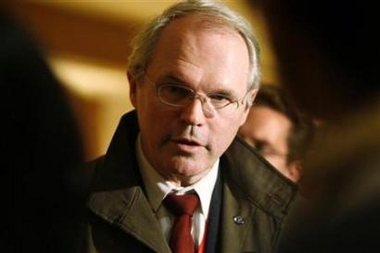Asia-Pacific
N. Korea talks expected to regroup
(Reuters)
Updated: 2007-03-23 19:54
 |
Large Medium Small |
 US Assistant Secretary of State and chief negotiator Christopher Hill answers questions after talks in Beijing, March 22, 2007. [Reuters]  |
The talks could resume in a week or two, he said.
"As soon as we get this bank transfer done, we probably will put out heads together and decide whether we need to have another six-party meeting," Hill said. "I think that's quite possible, because there are a couple of things that we want to get done."
Negotiators from North and South Korea, China, the United States, Japan and Russia gathered in Beijing on Monday, seeking to steer forward a February 13 deal which would give North Korea aid and security assurances in return for shutting down a nuclear reactor and preparing other disarmament steps by mid-April.
But a snarl-up over North Korean bank accounts in Macau diverted the meeting into long, fruitless talks over money transfers.
Throughout the session which ended Thursday, North Korea avoided discussing the deal to shut its plutonium-making Yongbyon reactor, demanding that its money in Macau's Banco Delta Asia first be transferred to a bank in Beijing.
On Monday, the US Treasury announced an end to its investigation into the Macau bank -- accused by Washington of harboring North Korean earnings from international crime -- opening the way for authorities there to unfreeze the accounts.
Chinese envoy Wu Dawei said on Thursday that moving the money was not as simple as writing a check or shipping cash in the back of a truck.
"If you were the owner of the $25 million, I don't think you would drive a car over to get the cash," Wu said.
Hill said the talks still had to sketch out what North Korea must do in the next phase of nuclear disarmament after the mid-April deadline, including forming a list of nuclear activities it will have to declare for future dismantlement.
Japanese Foreign Minister Taro Aso said he did not think the bank wrangle would endanger the deal to shut Yongbyon. "I don't think so, because unless it is fulfilled, we wouldn't see progress on talks about fuel aid," he said.
South Korean Foreign Minister Song Min-soon told local television that he expected the bank impasse to clear over the next week, opening the way for renewed disarmament talks.
North Korea boycotted six-party talks for over a year until last December, blaming the financial crackdown, and Washington agreed to defuse their complaints as part of the February deal.
Pyongyang was pressed back into the six-party negotiations after its first ever nuclear test explosion last October brought UN sanctions and widespread condemnation, including from its China.
Critics of the February deal have said North Korea is being rewarded for bad behavior.
Hill said the bank dispute did not mean that North Korea was sliding out of the February agreement.
"I don't think there's a broader point here about whether they're committed to the nuclear deal," he said. "I think they are, and throughout the week they reiterated that."
| 分享按钮 |
